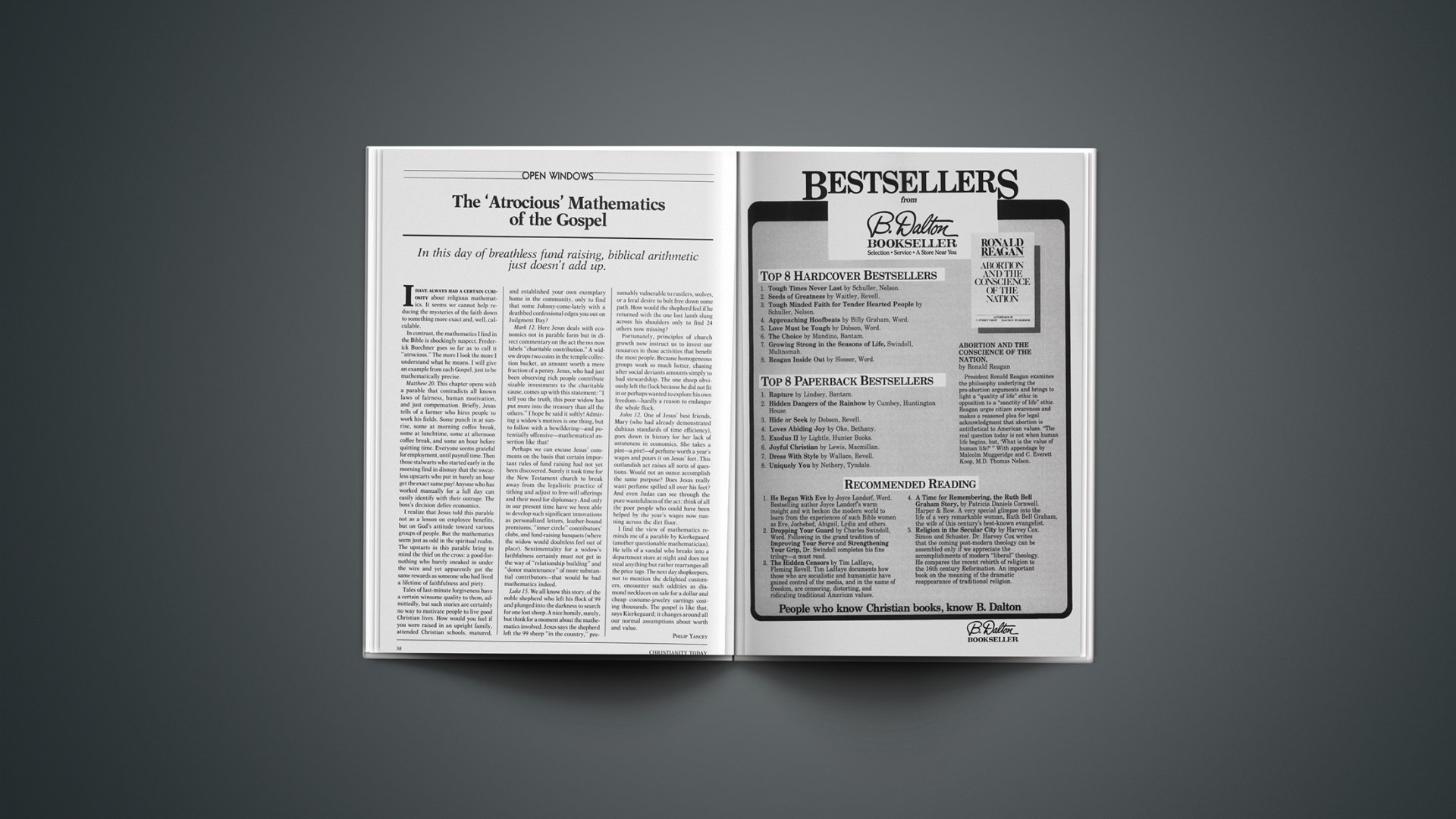In this day of breathless fund raising, biblical arithmetic just doesn’t add up.
I have always had a certain curiosity about religious mathematics. It seems we cannot help reducing the mysteries of the faith down to something more exact and, well, calculable.
In contrast, the mathematics I find in the Bible is shockingly suspect. Frederick Buechner goes so far as to call it “atrocious.” The more I look the more I understand what he means. I will give an example from each Gospel, just to be mathematically precise.
Matthew 20. This chapter opens with a parable that contradicts all known laws of fairness, human motivation, and just compensation. Briefly, Jesus tells of a farmer who hires people to work his fields. Some punch in at sunrise, some at morning coffee break, some at lunchtime, some at afternoon coffee break, and some an hour before quitting time. Everyone seems grateful for employment, until payroll time. Then those stalwarts who started early in the morning find in dismay that the sweatless upstarts who put in barely an hour get the exact same pay! Anyone who has worked manually for a full day can easily identify with their outrage. The boss’s decision defies economics.
I realize that Jesus told this parable not as a lesson on employee benefits, but on God’s attitude toward various groups of people. But the mathematics seem just as odd in the spiritual realm. The upstarts in this parable bring to mind the thief on the cross: a good-for-nothing who barely sneaked in under the wire and yet apparently got the same rewards as someone who had lived a lifetime of faithfulness and piety.
Tales of last-minute forgiveness have a certain winsome quality to them, admittedly, but such stories are certainly no way to motivate people to live good Christian lives. How would you feel if you were raised in an upright family, attended Christian schools, matured, and established your own exemplary home in the community, only to find that some Johnny-come-lately with a deathbed confessional edges you out on Judgment Day?
Mark 12. Here Jesus deals with economics not in parable form but in direct commentary on the act the IRS now labels “charitable contribution.” A widow drops two coins in the temple collection bucket, an amount worth a mere fraction of a penny. Jesus, who had just been observing rich people contribute sizable investments to the charitable cause, comes up with this statement: “I tell you the truth, this poor widow has put more into the treasury than all the others.” I hope he said it softly! Admiring a widow’s motives is one thing, but to follow with a bewildering—and potentially offensive—mathematical assertion like that!
Perhaps we can excuse Jesus’ comments on the basis that certain important rules of fund raising had not yet been discovered. Surely it took time for the New Testament church to break away from the legalistic practice of tithing and adjust to free-will offerings and their need for diplomacy. And only in our present time have we been able to develop such significant innovations as personalized letters, leather-bound premiums, “inner circle” contributors’ clubs, and fund-raising banquets (where the widow would doubtless feel out of place). Sentimentality for a widow’s faithfulness certainly must not get in the way of “relationship building” and “donor maintenance” of more substantial contributors—that would be bad mathematics indeed.
Luke 15. We all know this story, of the noble shepherd who left his flock of 99 and plunged into the darkness to search for one lost sheep. A nice homily, surely, but think for a moment about the mathematics involved. Jesus says the shepherd left the 99 sheep “in the country,” presumably vulnerable to rustlers, wolves, or a feral desire to bolt free down some path. How would the shepherd feel if he returned with the one lost lamb slung across his shoulders only to find 24 others now missing?
Fortunately, principles of church growth now instruct us to invest our resources in those activities that benefit the most people. Because homogeneous groups work so much better, chasing after social deviants amounts simply to bad stewardship. The one sheep obviously left the flock because he did not fit in or perhaps wanted to explore his own freedom—hardly a reason to endanger the whole flock.
John 12. One of Jesus’ best friends, Mary (who had already demonstrated dubious standards of time efficiency), goes down in history for her lack of astuteness in economics. She takes a pint—a pint!—of perfume worth a year’s wages and pours it on Jesus’ feet. This outlandish act raises all sorts of questions. Would not an ounce accomplish the same purpose? Does Jesus really want perfume spilled all over his feet? And even Judas can see through the pure wastefulness of the act: think of all the poor people who could have been helped by the year’s wages now running across the dirt floor.
I find the view of mathematics reminds me of a parable by Kierkegaard (another questionable mathematician). He tells of a vandal who breaks into a department store at night and does not steal anything but rather rearranges all the price tags. The next day shopkeepers, not to mention the delighted customers, encounter such oddities as diamond necklaces on sale for a dollar and cheap costume-jewelry earrings costing thousands. The gospel is like that, says Kierkegaard; it changes around all our normal assumptions about worth and value.










